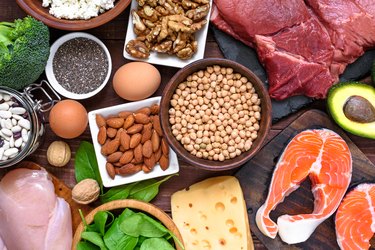
Many people buy protein supplements to build muscle mass, and some try protein for sore muscles. Strong evidence exists for the anabolic effects of protein, but no research shows that it can treat delayed onset muscle soreness, DOMS. Other options can help you recover from exercise.
Tip
Getting enough protein can help your body do many things, but it won't stop soreness. The authors of a May 2014 review in Sports Medicine evaluated data from thousands of subjects and found no relationship between protein intake and muscle soreness.
Video of the Day
Mechanisms and Treatments
If you haven't worked out in a while, you'll likely feel sore the day after you get back in the gym. The exact mechanisms for muscle soreness remain unknown, but the symptoms follow a clear pattern. The writers of an April 2016 article in the Brazilian Journal of Kinanthropometry and Human Performance studied the time course for this effect.
Video of the Day
These researchers tracked 15 cyclists as they recovered from a 130-kilometer race. Soon after the race, the riders reported intense feelings of soreness. These pain sensations disappeared within 48 hours. Interestingly, biochemical markers of muscle damage like creatine kinase stayed high for more than 72 hours.
Whey decreases creatine kinase, according to a small study of 12 elite male track runners published in the June 2017 issue of International Journal of Medical Sciences. There could, therefore, be a relationship between whey protein and muscle pain.
The authors of an April 2018 paper in Applied Physiology, Nutrition and Metabolism explored this possibility in a small study of 20 healthy women. Subjects took whey protein after doing repeated sprints. Compared to a placebo, this treatment decreased creatine kinase. It didn't affect muscle soreness.
Protein for Sore Muscles
These studies show that using protein powder after exercising won't help you treat muscle soreness. It's possible, however, that keeping your protein levels high before exercise will help you prevent muscle soreness.
The writers of a September 2018 report in Food and Function tested this hypothesis in a small study of eight healthy men. College students pre-loaded oat protein for 14 days. They then did an intense bout of downhill running. Compared to a placebo, men given 25 grams of oat protein each day experienced less soreness. The treatment also decreased creatine kinase.
While everyone has different protein needs, ingesting about 50 grams each day offers plenty for most people, according to a June 2019 article from Harvard Medical School. The subjects in the Food and Function study received half of this daily allowance. Thus, pre-loading will likely cause you to exceed your day-to-day needs. This excess protein can cause side effects.
The authors of a July 2013 paper in ISRN Nutrition studied thousands of cases and found several reasons to avoid excess protein intake. Getting too much protein will tax your kidneys, liver and bones. It could also put you at risk for heart disease and cancer. Given the limited benefits, it seems unwise to risk ingesting too much protein.
Other Options for Sore Muscles
Drinking protein shakes doesn't seem to help, but taking other supplements might treat exercise-related muscle soreness. The authors of a May 2015 report in the South African Medical Journal noted that nonsteroidal anti-inflammatory drugs, NSAIDs, can help. It's important, however, to not overuse drugs like acetaminophen, ibuprofen and aspirin. First, NSAIDs can damage your stomach. Second, they can prevent the muscle-building effects of exercise.
The active substance in turmeric — curcumin — works through a similar mechanism as NSAIDs. This supplement isn't as effective as the drugs at decreasing inflammation, but it also doesn't damage your stomach. In fact, curcumin blocks the ulceration caused by NSAIDs, according to a January 2013 report in Pharmacognosy Reviews.
Read more: Benefits of Turmeric Powder
The writers of an August 2015 paper in the European Journal of Applied Physiology looked at the effect of oral curcumin on muscle soreness in a small study of 17 healthy men. Subjects received the supplement for several days before and after a single bout of heavy exercise. Compared to a placebo, this treatment decreased muscle soreness. Interestingly, curcumin also had a performance-enhancing effect.
- Sports Medicine: "Effects of Protein Supplements on Muscle Damage, Soreness and Recovery of Muscle Function and Physical Performance"
- Brazilian Journal of Kinanthropometry and Human Performance: "Time-Course of Changes in Indirect Markers of Muscle Damage Responses Following a 130-km Cycling Race"
- International Journal of Medical Sciences: "Whey Protein Improves Marathon-Induced Injury and Exercise Performance in Elite Track Runners"
- Applied Physiology, Nutrition and Metabolism: "Whey Protein Hydrolysate Supplementation Accelerates Recovery From Exercise-Induced Muscle Damage in Females"
- Food and Function: "Effects of Oat Protein Supplementation on Skeletal Muscle Damage, Inflammation and Performance Recovery Following Downhill Running in Untrained Collegiate Men"
- Harvard Medical School: "How Much Protein Do You Need Every Day?"
- ISRN Nutrition: "Adverse Effects Associated with Protein Intake above the Recommended Dietary Allowance for Adults"
- South African Medical Journal: "Delayed Onset Muscle Soreness"
- Pharmacognosy Reviews: "Turmeric (Curcumin) Remedies Gastroprotective Action"
- European Journal of Applied Physiology: "Curcumin Supplementation Likely Attenuates Delayed Onset Muscle Soreness (DOMS)"